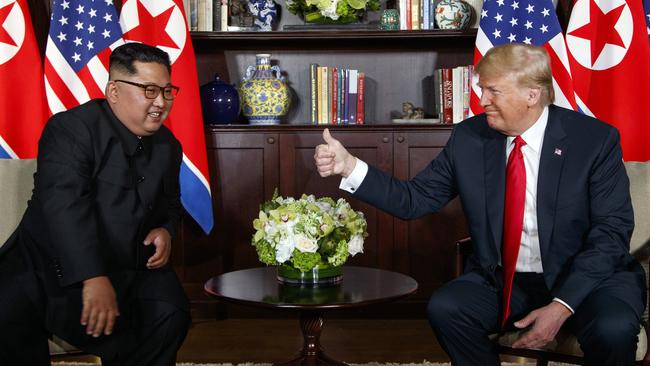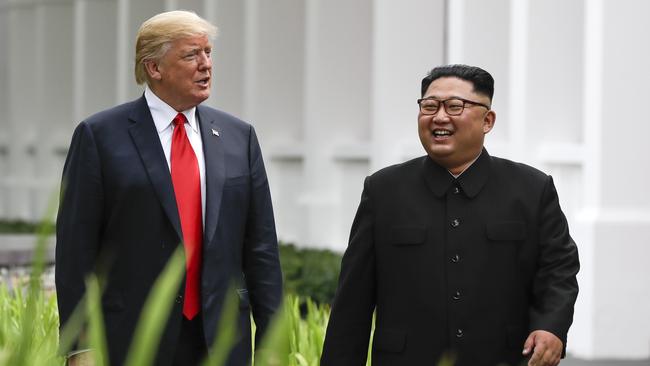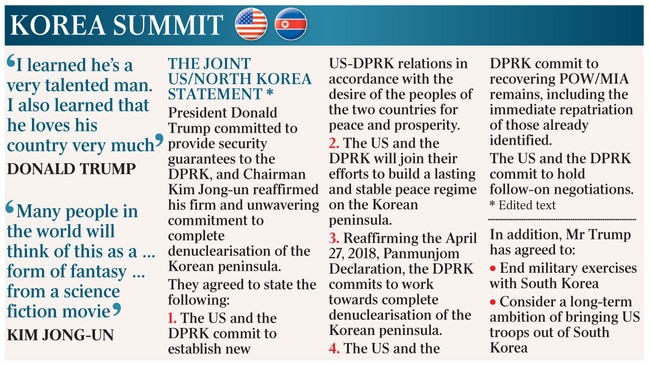Singapore summit: Donald Trump puts trust in Kim Jong-un
Kim Jong-un has promised Donald Trump he will denuclearise North Korea, paving the way for a new era in relations.

Kim Jong-un has promised Donald Trump he will denuclearise North Korea, paving the way for a new era in the regime’s relations with the US and potentially defusing the world’s most serious security threat.
In a history-making summit in Singapore, Kim committed North Korea to getting rid of its nuclear weapons in return for security guarantees from the US — although the US President conceded last night the process could take at least 15 years.
The security guarantees include stopping American war games with South Korea and the possible future reduction of US troops in South Korea.
North Korea also committed to recovering the remains of US soldiers, more than 6000 of whom went missing in action or died as prisoners during the Korean War.
The commitments came after an extraordinary first summit between a sitting US president and a North Korean leader, during which Kim received equal billing with Mr Trump, with DPRK flags flying alongside those of the US.
In more than four hours of talks at Singapore’s luxurious Capella Hotel, the two former enemies shook hands, laughed together and appeared to get on well.
Mr Trump said they had struck a “special bond” as Kim turned to him and said through his translator: “Many people in the world will think of this as a … form of fantasy … from a science-fiction movie.”
The warm exchange contrasted with the provocative rhetoric months earlier, when Mr Trump threatened to deliver to North Korea “fire and fury like the world has never seen” and taunted Kim by calling him “little rocket man’’. Kim described the American President as a “dotard”.
But in an unprecedented public statement yesterday, Kim promised that the world would see a “major change” in his country. “We have decided to leave the past behind and we have decided to sign this historic document.”

Mr Trump said the summit had turned out “better than anyone expected” and would mark a new era in relations with the Stalinist regime. “We are prepared to start a new history, write a new chapter between our nations,’’ he said.
“The past does not have to define the future. History has proved over and over again (that) adversaries can indeed become friends.
“We both want to do something and we’ve developed a very special bond. We are going to take care of a very big and a very dangerous problem for the world.”
Speaking after the summit, Mr Trump suggested denuclearisation could take at least 15 years “if you go rapidly”, because of the complexity of the process. “It just can’t be done, scientifically … But they’re gonna start immediately. They already started. They blew up a site,” he told US ABC News.
Asked in the interview how he could trust someone he had labelled a killer, Mr Trump said during his many deals, sometimes those he distrusted had turned out to be the most honourable ones. “And the people that you do trust, they are not the honourable ones.”
Mr Trump said the US would save a lot of money by ending “provocative” war games with South Korea and would consider reducing the 32,000-strong US troop force in South Korea.
South Korean President Moon Jae-in praised Kim’s decision to attend the summit. “Leaving dark days of war and conflict behind, we will write a new chapter of peace and co-operation,” he said.

“We will be there together with North Korea along the way.”
Japan’s Prime Minister, Shinzo Abe, welcomed the joint statement as a first step in the denuclearisation of North Korea.
“We see this as a step in a comprehensive resolution,” Mr Abe said in Tokyo.
China’s Foreign Minister, Wang Yi, said the fact the two leaders could sit together and have “equal talks” had “important and positive meaning, and is creating a new history”.
“The crux of the peninsula nuclear issue is a security issue,” Mr Wang said. “The most important, difficult part of this security issue is for the US and North Korea to sit down to find a way to resolution via equal talks.”
Russia’s Deputy Foreign Minister, Sergei Ryabkov, said Russia was ready to help implement the deal and hoped settling the nuclear crisis would unblock economic co-operation.
Mr Trump said economic sanctions against North Korea would remain in place until the US was confident nuclear weapons were “no longer a factor”. He foreshadowed that he would invite Kim to the White House and would visiting Pyongyang.
The agreement commits the nations to work towards “complete denuclearisation of the Korean peninsula” but does not specify further details. “Chairman Kim Jong-un reaffirmed his firm and unwavering commitment to complete denuclearisation of the Korean peninsula,” it said.
The agreement does not explain how or when denuclearisation should proceed. Many experts were critical last night, saying the deal was too vague and did not commit Kim to specific actions.

Mr Trump said there was no time to include details in the agreement. He described his talk with Kim as “honest, direct and productive”. “He has an opportunity like no other — to be remembered as a leader who ushered in a glorious new era of prosperity,” he said. “Today is the beginning of an arduous process: our eyes are wide open but peace is always worth the effort.”
He said both leaders had agreed to “vigorous” negotiations to implement the agreement as soon as possible. North Korea previously reneged on denuclearisation promises, but Mr Trump said he thought Kim was genuine.
The agreement calls on both countries to “commit to establish new US-DPRK relations in accordance with the desire of the peoples of the two countries for peace and prosperity”.
The summit began with a handshake at the Capella Hotel.
After greeting Mr Trump, the North Korean leader told him: “It was not easy to get here … the old prejudices and practices worked as obstacles on our way forward. But we overcame all of them and we are here today.”
The two then met for 45 minutes alone before they were joined by their delegations, including for the US, Secretary of State Mike Pompeo, White House chief of staff John Kelly and national security adviser John Bolton. More than four hours later, the leaders emerged to sign the document, answer questions and shake hands.
Cameron Stewart is also US contributor for Sky News Australia.







